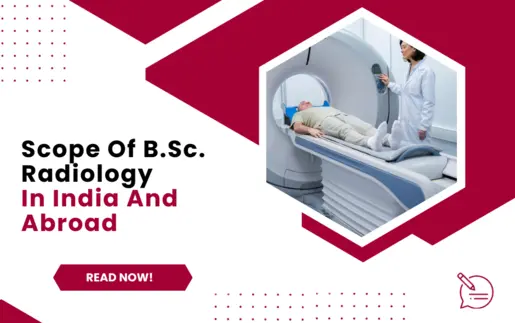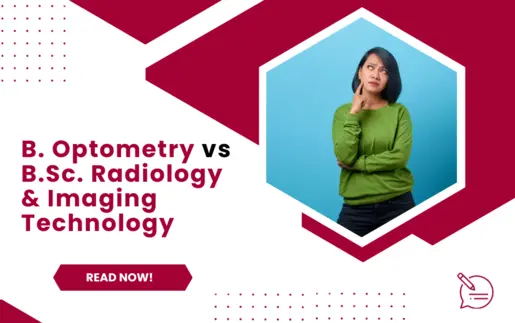Career Opportunities after B.Sc. Forensic Science: A Guide to Your Future
So you've aced your B.Sc. in Forensic Science, and the world of criminal investigation is beckoning. You've unlocked the fascinating world of fingerprints, DNA analysis, and trace evidence, but what now? Many students think the only path is the dramatic world of crime scene investigation. But the truth is, a forensic science degree opens doors to a surprisingly diverse range of exciting careers. This blog will unveil the multitude of career opportunities after B.Sc. Forensic Science, helping you find the perfect fit for your skills and interests. We'll explore everything from laboratory analysis and digital forensics to research and scientific writing. Get ready to dive into the thrilling world of forensic science and discover where your scientific expertise can take you!

What is meant by Forensic Sciences?
‘Forensic’ is derived from the Latin word ‘forensis,’ which means of or before the forum.
Forensic science is the use of science in criminal investigations and legal issues. It is broad and includes a variety of scientific disciplines, such as chemistry, biology, physics, geology, physiology, and social sciences.
Investigations into crimes like rapes, murders, and drug trafficking are all part of forensic science.
Career Opportunities after B.Sc. Forensic Science
Direct Forensic Roles:
Crime Scene Investigators (CSIs): The initial responders, CSIs meticulously collect and document evidence at crime scenes. This role demands keen observation, meticulous attention to detail, and the ability to preserve evidence in potentially chaotic environments.
Forensic Laboratory Analysts: The lab is your domain! Analyse material evidence using advanced techniques in various specialisations:
Criminalistics Chemists: Analyze blood spatter patterns, identify drugs, or examine gunshot residue using chemistry principles.
Toxicologists: They study the complexities of poisons and their effects. They analyse bodily fluids and tissues to detect drugs, toxins, and other chemicals crucial to investigations.
DNA Analysts: This central pillar of modern forensics involves extracting, analysing, and interpreting DNA evidence to link suspects to crimes or identify victims.
Specialised Forensic Fields:
Forensic Anthropologists: This unique speciality involves identifying human remains. Using your knowledge of skeletal anatomy and archaeology, you can assist investigations and determine details about the deceased, like the cause or time of death.
Forensic Pathologists: These medical doctors perform autopsies to determine the cause and manner of death in suspicious cases. Medical expertise and the ability to handle emotionally charged situations are essential.
Clinical Forensic Medicine Specialists: These professionals examine living victims of assault or abuse, documenting injuries and collecting evidence for legal proceedings. This path combines medical knowledge with a deep understanding of the legal system.
Crime Language Experts (Forensic Linguists): If you have a talent for languages and a keen eye for detail, specialise in forensic linguistics. Analyse written or spoken communication used in criminal activity, like ransom notes or threat letters.
Beyond Core Forensics:
Digital Forensics: Our digital world demands specialists to analyse electronic devices for evidence. To enter this growing field, pursue short courses in computer forensics or cybersecurity.
Environmental Forensics: Investigate environmental crimes like pollution or illegal waste disposal. Consider postgraduate programs in environmental science with a forensic focus.
Supporting Roles in Forensics:
Forensic Lab Technicians: Assist forensic scientists in laboratories. Prepare evidence, conduct fundamental analyses, and maintain equipment. On-the-job training or short courses in laboratory procedures can qualify you for this role.
Crime Scene Photography: Skilled photographers meticulously document crime scenes using specialised techniques. To develop this valuable skill set, explore short courses in forensic photography.
Forensic Sketch Artist: Using witness descriptions and evidence, create composite drawings of suspects. Hone your artistic and observational skills through art schools or specialised forensic sketch artist programs.
Short-Term Courses After B.Sc. in Forensic Science
After your B.Sc. in Forensic Science, short-term courses can be a fantastic way to boost your skillset and specialise in a particular area of forensics. These courses typically range from a few weeks to a few months, allowing you to gain focused knowledge without a long-term commitment. Here are some exciting short-term course options to consider:
Crime Scene Investigation (CSI) Essentials:
This course equips you with the fundamentals of crime scene processing. You'll learn about proper evidence collection, documentation techniques, and crime scene photography.
Benefit: Gain the foundational knowledge to assist CSIs or prepare for further CSI training.
Fingerprint Analysis:
Delve into the world of fingerprint identification. This course covers fingerprint classification, lifting techniques, and analysis methods used to link suspects to crime scenes.
Benefit: Become proficient in a core forensic technique used in countless investigations.
Bloodstain Pattern Analysis:
Learn how to analyse bloodstain patterns at crime scenes. This course explores the interpretation of bloodstain patterns to reconstruct events and determine the origin and movement of blood.
Benefit: Develop a valuable skill that can provide crucial insights for crime scene reconstruction.
Forensic Toxicology Essentials:
Gain a foundational understanding of forensic toxicology, focusing on analysing bodily fluids and tissues for drugs, poisons, and other chemicals.
Benefit: Open doors to a career path in toxicology labs or further studies in this specialised field.
Digital Forensics Fundamentals:
Explore the basics of digital forensics, including electronic device evidence collection, analysis techniques, and data recovery methods.
Benefit: Prepare for a role in the ever-growing field of digital forensics, which is crucial for investigating cybercrimes.
Other Interesting Options:
Forensic Photography: Master the art of crime scene photography, learning proper techniques for capturing detailed and legally admissible evidence.
Forensic Sketch Artist Training: Develop your artistic and observational skills to create composite facial sketches of suspects based on witness descriptions.
Forensic Document Examination: Learn how to analyse questioned documents to identify forgeries, alterations, or origins.
Deepen Your Expertise: Full-Time Courses After B.Sc. Forensic Science
A B.Sc. in Forensic Science provides a strong foundation, but for those seeking advanced knowledge and specialised skills, full-time courses offer a fantastic way to propel your career forward. Here's a breakdown of some enticing options to consider:
Master's Degrees in Forensic Science:
This comprehensive program delves deeper into core forensic science disciplines like forensic biology, chemistry, and toxicology. You'll gain advanced theoretical knowledge and practical skills through laboratory-based coursework and research projects.
Master of Science (M.Sc.) in a Forensic Science Specialization:
Many universities offer specialised Master's programs focusing on specific areas like:
Forensic Toxicology: Become an expert in analysing drugs, poisons, and other chemicals in biological samples, crucial for investigations involving intoxication or poisoning.
Forensic DNA Analysis: Master the advanced techniques used in DNA analysis for identification, kinship testing, and linking suspects to crime scenes.
Digital Forensics: Specialize in the recovery, analysis, and presentation of electronic evidence from digital devices, a rapidly growing field in the digital age.
Forensic Accounting: Combine your forensic science background with accounting expertise to investigate financial crimes like fraud and embezzlement.
Additional Full-Time Options:
Postgraduate Diploma in Forensic Science: These programs offer concentrated coursework in a specific forensic science area, often requiring less time than a Master's degree.
By investing in a full-time course after your B.Sc., you can unlock exciting Career Opportunities after B.Sc. Forensic science has become a highly sought-after forensic science professional and has significantly contributed to the field.
Top Recruiters for B.Sc. Forensic Science
The government requires graduates with degrees in Forensic Sciences. The following are the top recruiters:
- Information Bureau (IB)
- Bureau of Central Investigation (CBI)
- Centres for Forensic Science in the Government
- Army
- Bureau of Narcotic Control
- Police Division
- Law Offices
- Hospitals
Do you want to advance your career in forensics? Admissions open for B.Sc. Forensic Sciences at CGC, Jhanjeri. Modern facilities and knowledgeable faculties are present to guide the students and shape their careers. The CGC Jhanjeri is the Best B.Sc. Forensic Sciences College in Mohali is intended to give students a strong foundation in the scientific and technical aspects of forensic techniques, evidence processing, and crime scene investigation.
FAQs
Q. What is the duration of the B.Sc. Forensic Sciences at CGC, Jhanjeri?
A. The duration of B.Sc. Forensic Sciences at CGC, Jhanjeri, is 3 years and is divided into six semesters.
Q. What is the role of forensic scientists?
A. The evidence from crime scenes is gathered and examined by forensic experts. From DNA sampling to blood pattern analysis, forensic scientists perform them all.
Q. How reliable is a forensic science degree?
A. The future of forensic science is bright and profitable. Students can be employed in various firms, such as forensic laboratories, crime investigation divisions, private firms, and even higher education and specialisations.
Q. Does CGC Jhanjeri offer internships and practical training to the students?
A. Yes, practical training and internships are part of the curriculum at CGC, Jhanjeri. These help students gain practical knowledge and theoretical concepts.



















